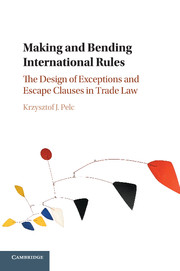Book contents
- Frontmatter
- Dedication
- Contents
- List of Tables
- Acknowledgments
- 1 The “Architectural Challenge” of International Rules
- 2 A Theory of the Design of Flexibility
- 3 A Brief Intellectual History of Flexibility in Law
- 4 The Twin GATT Exceptions: Fears and Solutions
- 5 The Evolving Design of Flexibility
- 6 The Bad News
- 7 The Good News
- 8 The Great Recession and Beyond
- Bibliography
- Index
4 - The Twin GATT Exceptions: Fears and Solutions
Published online by Cambridge University Press: 05 September 2016
- Frontmatter
- Dedication
- Contents
- List of Tables
- Acknowledgments
- 1 The “Architectural Challenge” of International Rules
- 2 A Theory of the Design of Flexibility
- 3 A Brief Intellectual History of Flexibility in Law
- 4 The Twin GATT Exceptions: Fears and Solutions
- 5 The Evolving Design of Flexibility
- 6 The Bad News
- 7 The Good News
- 8 The Great Recession and Beyond
- Bibliography
- Index
Summary
ARTICLE XXI: THE GATT SECURITY EXCEPTION
To witness vague, unconstrained exceptions to binding commitments, one need not look all the way back to medieval law, or nineteenth century Bismarckian power struggles. Since the early days of the trade regime, the GATT has featured a set of exceptions of disconcerting breadth. One of these, GATT Article XXI, may be the broadest, least constrained formal exception in the trade regime: so “broad, self-judging, and ambiguous that it obviously can be abused” (Jackson, 1997a, 230).
I outline policymakers’ full menu of flexibility options in the regime in the next chapter, yet it is worth first considering the design of and reliance on Article XXI, and comparing it to its non-security analogue provision, Article XX, the General Exceptions. Indeed, the “catch-all” flexibility provision in Article XXI makes for an ideal case study of how member states treat unchecked exceptionality. The puzzle is a familiar one by now: how can the trade regime tolerate the continued existence of a flexibility provision that is prima facie costless, and the use of which is effectively unchecked? Why has the existence of Article XXI not led to the system's downfall, given the lack of constraints put on its use?
The relevant section of GATT Article XXI, which was part of the original 1947 text but applies to the WTO agreements to this day, reads:
Nothing in this Agreement shall be construed:
(a) to require any contracting party to furnish any information the disclosure of which it considers contrary to its essential security interests; or
(b) to prevent any contracting party from taking any action which it considers necessary for the protection of its essential security interests
(i) relating to fissionable materials or the materials from which they are derived;
(ii) relating to the traffic in arms, ammunition and implements of war and such traffic in other goods and materials as is carried on directly for the purpose of supplying a military establishment;
(iii) taken in time of war or other emergency in international relations; or
(c) to prevent any contracting party from taking any action in pursuance of its obligations under the United Nations Charter for themaintenance of international peace and security.
In the following examination of Article XXI, I put forward three main points.
- Type
- Chapter
- Information
- Making and Bending International RulesThe Design of Exceptions and Escape Clauses in Trade Law, pp. 93 - 136Publisher: Cambridge University PressPrint publication year: 2016



